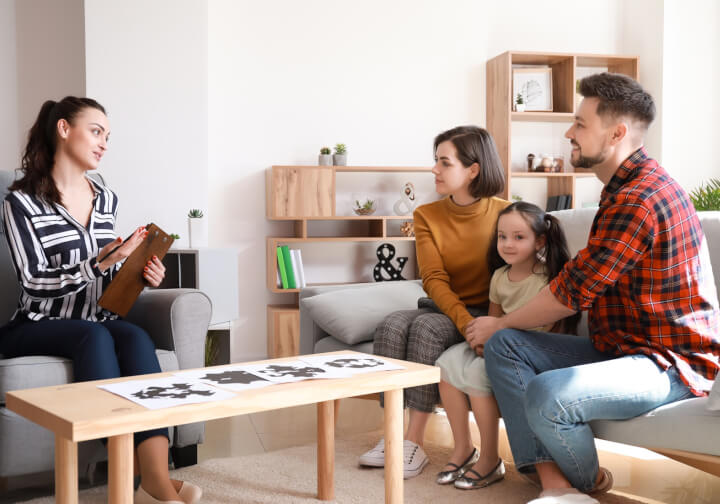
The importance of psychotherapy for children
Children, like adults, can go through difficult periods during which their mental balance is disturbed. This may be a reaction to external events (parental divorce, bullying, moving house, loss of a loved one), but also to internal problems (anxiety, attention disorders, somatization). Psychotherapy for children provides a structured, professionally guided space in which children can identify and process these difficulties and find healthier ways of dealing with them.
Psychotherapy for children has both preventive and therapeutic value. It often helps parents to better understand what is happening with their child and supports the entire family system.
When to consider psychotherapy for a child?
The following situations may be reasons to consult a psychotherapist:
-
recurring emotional difficulties (anxiety, sadness, tearfulness, irritability),
-
behavioral disorders (defiance, aggression, passivity),
-
problems at school (decline in performance, conflicts with peers),
-
somatic symptoms without medical explanation (stomachaches, headaches, sleep disorders, bedwetting, rashes),
-
reactions to stress (divorce, death in the family, trauma, bullying),
-
impaired development (speech, socialization),
-
eating disorders, OCD, ADHD, depression – already diagnosed or suspected.
Specifics of child psychotherapy
Psychotherapy for children has its own developmental specifics. Children often lack the verbal capacity to directly name their problems. Therefore, play, symbolic, and nonverbal techniques are used in therapy to convey experiences in a less directive form.
The form of work also varies according to the age of the child:
-
Preschool children (3 to 6 years): Therapy takes place mainly through play, drawing, and modeling. The therapist observes symbolism, encourages the expression of emotions, and offers corrective experiences.
-
Younger school age (7 to 11 years): In addition to play, elements of storytelling and role-playing appear, and work with emotions and self-awareness begins.
-
Adolescents (12+): Here, verbal forms of therapy are more common, working with identity conflicts, relationships, values, and self-reflection. It may resemble psychotherapy for adults, but with an emphasis on developmental dynamics.
Working with children often involves regular contact with parents or broader cooperation with the school, paediatrician or child psychiatrist. In more complex cases, family therapy is recommended, as the child's difficulties may reflect tensions within the system.
Forms and directions of psychotherapy for children
Different therapeutic approaches use different methods, but the goal is always similar: to support healthy psychological development and the child's adaptation to different situations.
-
Psychodynamic therapy for children – focuses on unconscious conflicts, symbolic expression (play, drawing), perceives symptoms as messages about internal conflict.
-
Cognitive-behavioral therapy (CBT) – a structured approach that teaches children to recognize and change their thoughts, behaviors, and reactions, e.g., in cases of anxiety or OCD.
-
Gestalt therapy – develops perception, contact, and responsibility. It often works with children through movement, drawing, and dialogue.
-
Humanistic approaches (e.g., Rogerian therapy) – emphasizes relationships, supporting growth, and acceptance.
-
Family therapy – works with the whole family as a system. The child is not the "problem" but the bearer of tension in the system.
-
Play therapy – the main tool for younger children. It helps develop emotional awareness and resolve internal conflicts.
Goals of psychotherapy for children
-
Improve emotional regulation
-
Support healthy coping strategies
-
Strengthen self-esteem and identity
-
Improve relationships (in the family, at school, among peers)
-
Reduce symptoms (e.g., anxiety, aggression, behavioral disorders)
-
Help the child cope with trauma or change
-
Develop the ability to understand one's own emotions and needs
Psychotherapy for children is an important tool for supporting mental health in the early stages of life, when the foundations of personality, relationship patterns, and coping strategies are formed. Providing therapeutic help early on can prevent problems from becoming chronic and bring relief to both the child and the whole family.
A child who experiences a safe, supportive therapeutic relationship is more likely to grow up to be a mentally resilient adult with sufficient skills to cope with life's challenges.
Sources:
Hort, V., Hrdlička, M. a kol. (2008). Dětská a adolescentní psychiatrie. Praha: Portál.
Geldard, K., Geldard, D. (2008). Dětská psychoterapie a poradenství. Praha: Portál.
Ronenová, T. (2000). Psychologická pomoc dětem v nesnázích – kognitivně-behaviorální přístupy při práci s dětmi. Praha: Portál. Vágnerová, M. (2005). Vývojová psychologie I. – Dětství a dospívání. Praha: Karolinum.
https://www.pvsps.cz/data/2017/05/30/12/ppf-zp-minarova.pdf?id=262
